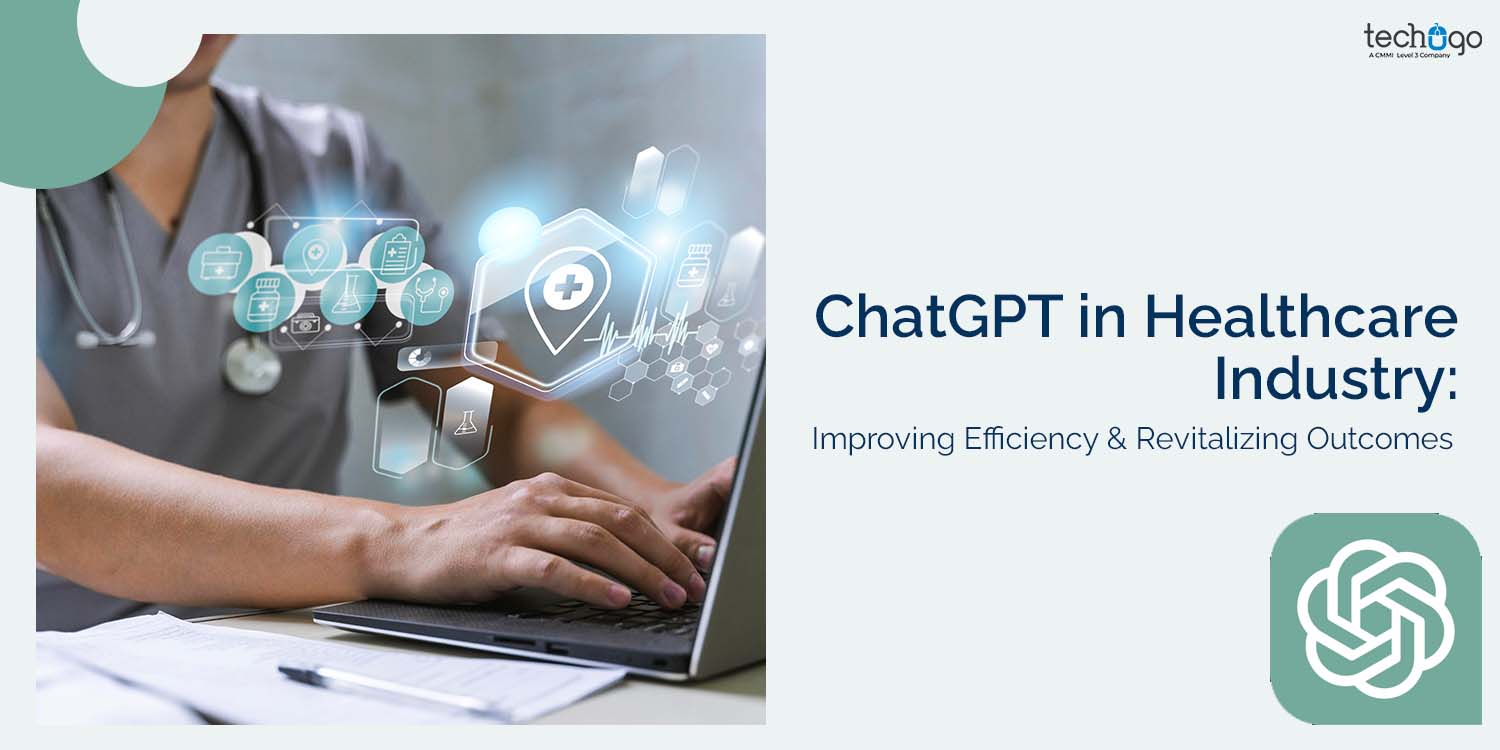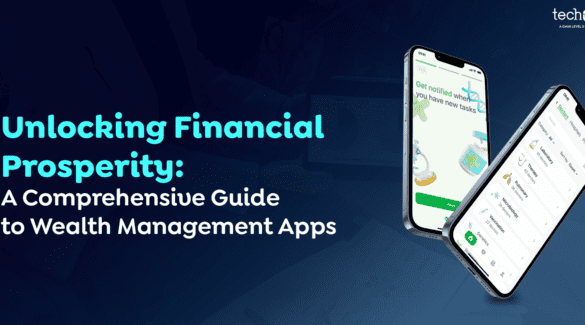5 Apr 2023
ChatGPT in Healthcare Industry: Improving Efficiency & Revitalizing Outcomes
Namrata

ChatGPT has the potential for Healthcare to change the game. ChatGPT has been making waves since November 2022. It’s written code, poems, and passed exams. ChatGPT passed with a passing score of around 60%. However, it scored more than 50% accuracy on all three components and 60% on the majority.
What is ChatGPT exactly?
ChatGPT, a language generation model created by OpenAI, is the latest player in the growing conversational AI market. It is estimated that it will reach USD 18.4 million by 2026. In addition, ChatGPT uses deep learning algorithms called “transformers” to generate text responses from the input it receives. This is one of the most impressive examples of conversational AI.
Must Read : How AI Chatbot App Development Will Transform The Industry in 2023?
ChatGPT in Healthcare Industry: Use cases
ChatGPT is a vital topic of conversation between healthcare providers and patients. Although it is still in its early stages, ChatGPT has the potential to automate many tasks, support busy medical professionals, and provide better treatment.
These are some of the most common uses:
Virtual Health Assistants
Virtual health assistants can be digital tools that offer support and information to patients. They can be accessed via various channels, including websites, mobile apps, and messaging platforms.
ChatGPT can easily be integrated into a conversational interface to answer patients’ questions and provide advice quickly. ChatGPT is a great way to reduce stress from routine tasks, given the predicted shortage of 10,000,000 healthcare workers by 2030.
Billing, Medical Coding, and Reports Generating
ChatGPT can assist with medical billing and coding by suggesting the best codes based on symptoms and history. In addition, it can automate discharge summaries, clinical encounter reports, and other tasks that free up time for patient care. It can also analyze large quantities of medical data, such as billing and code data, to find patterns and trends and identify opportunities for improvement.
Medical professionals can make more informed decisions regarding billing and coding. ChatGPT combines advanced conversational AI capabilities to significantly improve and increase the accuracy and efficiency of these crucial functions.
Telemedicine
ChatGPT is a telemedicine platform that allows patients to access virtual health consultations on demand and triage their symptoms. It can help patients identify potential health issues and guide them on what to do next. Patients can choose to see a doctor or go home and treat their health issues.
Telemedicine providers can use it to gain real-time insight into patients’ medical history and provide accurate diagnoses. In addition, it can automate consultation appointment scheduling, which helps reduce wait time and streamlines the process.
Health Education
ChatGPT can educate patients about various health topics, such as managing chronic conditions and understanding treatment options. It can also help them adopt healthy lifestyles. ChatGPT can answer and provide information about health and wellness to help people make informed decisions about their health. In addition, it can be integrated into educational content such as videos, articles, and interactive quizzes to deliver more health education.
ChatGPT can support behavior change with personalized interventions. In addition,
As you are aware of the cost to develop a healthcare app, let’s move on to ChatGPT market research.
ChatGPT for market research
ChatGPT’s ability to interpret the context and provide relevant data could make it a valuable resource for market analysis, collecting, analyzing, and understanding trends. The tool has many key advantages, including the ability to streamline existing processes and collect qualitative data via informal surveys. It can also analyze large volumes of unstructured data and extract valuable market information. This will save researchers significant time and effort.
ChatGPT was a positive influence on the market. 45% of respondents believed ChatGPT would significantly impact the industry. 36% are currently researching ChatGPT and expect its use to grow. ChatGPT should also influence market research, according to the survey findings. To make traditional market research more efficient, many factors must be considered. ChatGPT is expected to be explored by more market research firms. We are hopeful that it will positively impact their market research processes.
How ChatGPT could transform Healthcare in the future?
ChatGPT is used by 27% of people to find research ideas.
A survey found that ChatGPT was used by 27 percent of respondents to brainstorm ideas and 24 percent to create codes. According to the Nature survey, ChatGPT can be used for boring or repetitive tasks and research. This includes debugging code and crunching numbers. It also allows you to analyze large data sets.
HIPAA Compliance is an essential factor in developing a healthcare app. For a successful app in healthcare, it is crucial to have a top mobile app development company with expertise in HIPAA Compliant and healthcare app development.
Evidence is strong that AI can be used in clinical research. Machine learning, a branch of AI, simplifies the process of drug-target identification, candidate molecule generation, and other aspects of AI. AI in healthcare improves predictive modeling of drug-target interactions and protein structures. AI in Healthcare also contributes to data management, analysis, and collection.
Wearables and other electronic devices have replaced the need for study visits by generating patient healthcare data. As a result, wearables could be a way to identify biomarkers. However, digital biomarkers will require ML processing to extract insights.
ChatGPT is an innovation that will allow AI to be elevated in Healthcare. It will be able to answer questions and write long manuscripts. This, combined with its problem-solving abilities, will surpass current expectations.
Respondents expressed concerns about the reliability and misuse of tools. For example, one respondent stated that ChatGPT had created a fictional literature list, but none of the publications were available, which needs to be more accurate.
Also Read : Why Must You Opt for Hotel Chatbot in 2023?
ChatGPT predicts medical conditions in seconds
It is essential to extract valuable insights from clinical data to improve patient care. Computerized clinical decision support systems (CDS) can improve patient care and translate research findings into practical interventions. AI/ML and clinical decision support are integrated to extract helpful information from clinical data.
AI technology enables healthcare providers to predict the likelihood of patients developing chronic diseases and adjust treatment plans accordingly. For example, ChatGPT, a chatbot for Healthcare, has instant access to terabytes upon request. This allows doctors to predict medical conditions accurately.
OpenAI’s innovative technology can revolutionize Healthcare apps by asking patients repetitive questions with higher accuracy. Its interactive nature makes it easy for providers to answer questions about care conditions. In addition, ChatGPT AI allows providers to predict potential ailments.
ChatGPT ChatStreamline Admin Task
Physicians spend, on average, 10 hours per week filling out paperwork. Administrative work can result in burnout and less time with patients. ChatGPT allows healthcare providers and front-desk personnel to save time and concentrate on vital work.
Physicians can simplify the documentation process and create medical charts and discharge instructions. For example, ChatGPT was tested by a Boston physician who asked for a graph to be made for a fictional patient with a cough. The system provided a template that was quite good.
Patients who use ChatGPT AI to seek answers to their symptoms run the risk of misinformation. ChatGPT can also be used by admin staff to produce reports and write-ups, easing their burden instantly.
AI can help you make better treatment decisions
Healthcare providers are using AI to improve diagnosis and make better medical decisions. For example, AI can help improve the outcomes of patients with diabetes, heart disease, or cancer. AI algorithms can respond quickly to data and provide precise treatment.
Predictive analytics can help determine the likelihood of sudden cardiac death and the outcome of heart surgery.
ChatGPT, the latest innovation in AI, can make antibiotic prescription decisions. ChatGPT was able to understand and give answers to scenarios. As a result, it understood the need for antibiotics to treat bacterial infections.
ChatGPT AI can be used in Healthcare to perform miracles for various treatments. For example, ChatGPT AI can provide 24/7 medical support for patients with chronic conditions and who are bedridden. Koko, a non-profit organization specializing in mental health and behavioral health research, also found ChatGPT could provide basic answers to common mental issues. It is essential to consider whether ChatGPT can filter out sensitive information for people with mental health conditions.
Also Read : How Chatbots Make E-Commerce Marketing More Effective?
Patient Assistance via Virtual Support
Chatbots are known to help patients with their medical questions. It can help patients get information about their health and answer any questions.
ChatGPT AI can be used to remind patients about their medication, their upcoming appointments, and details about side effects. It can also assist with follow-up care for patients recently discharged from the hospital. Healthcare Chatbots can communicate with patients, offer self-care advice, schedule follow-up appointments, and inquire about their recovery.
Artificial intelligence plays a significant role in transforming the future healthcare sector. However, ChatGPT, an AI-driven tool that allows people to do small and oversized tasks easily, can stop the learning process.
Wrapping up
ChatGPT in the Healthcare industry has some limitations, as do all language models. However, ChatGPT in the Healthcare industry has one primary rule: bias in training data can lead to inaccurate or biased responses.
ChatGPT is also a statistical model that needs a healthcare professional’s medical expertise and judgment. It cannot diagnose or treat any medical condition, even if it scores above 60% on a medical test. ChatGPT must ensure that sensitive medical information is kept private and secure.
ChatGPT, even with these limitations, can help improve healthcare and patient outcomes. Connect with Techugo, the healthcare app development company to know more about ChatGPT.
Get in touch.
Write Us
sales@techugo.comOr fill this form



